Researching Sport for Development in Liberia
By Zoe Roberts ’23
The Global Research Institute’s Summer Fellows Program provides international experiential learning opportunities to W&M students. This post is one installment of a series highlighting the 2022 Fellows’ key discoveries and formative experiences.
Through GRI’s Summer Fellows Program, I worked on a project evaluating the impact of sports participation on educational and leadership outcomes in Liberia and Morocco. This research will also provide a broader analysis of the efficacy of sport for development. Melissa — another Summer Fellow — and I spent a month in Liberia and a week in Morocco. We worked with local research organizations in both countries to host festival days where we tested the kids on their academic and pro-social skills. This experience was an amazing point of entry to the challenges and rewards of conducting international research and working in an unfamiliar environment.
My introduction to Liberian culture and community started even before I arrived. The man sitting next to me on the plane to Sierra Leone was a Liberian emigrant who was returning home for the first time since the beginning of the pandemic. I learned all about his family, friends, and education, and he gave me all sorts of advice about Liberia — including that I should only eat West African foods. As I would soon learn, this friendliness was indicative of the welcoming and kind attitude that proved to be ubiquitous in Liberia.
On my first day in Liberia, I met Sona (the head of the LEAD Edu school in Liberia), who helped me get acquainted with the capital city, Monrovia, where we would be staying for the next month. She also introduced us to the team at the Center for African Research and Training (CART) we would be working with to set up and conduct the impact evaluation. James, the office manager, welcomed us with office warming gifts and told us that he was there to support us with whatever we needed. Kou, the head of the CART office, greeted us warmly and introduced herself, describing how she also runs the neighboring health clinic and splits the time between the two.
After getting settled into our apartment and our office space, Melissa and I began our work. We first collated the data we had received from the school, and once we had gathered all the student information, we prepared call scripts, which the local enumerators used to invite the students to our festivals. We then coordinated with a local private school to invite some of their students as a comparison group. While the invitation calls were being made, Melissa and I continued to organize festival logistics and manage budget needs, student transportation, and equipment. After almost a month of working consistently, collaborating with our Liberian partners, and settling into life in Liberia, we were able to attend the first of the festival days. After all our hard work, watching the enumerators working with the kids and seeing the kids play games together, was a wonderful way to conclude our time in Liberia.
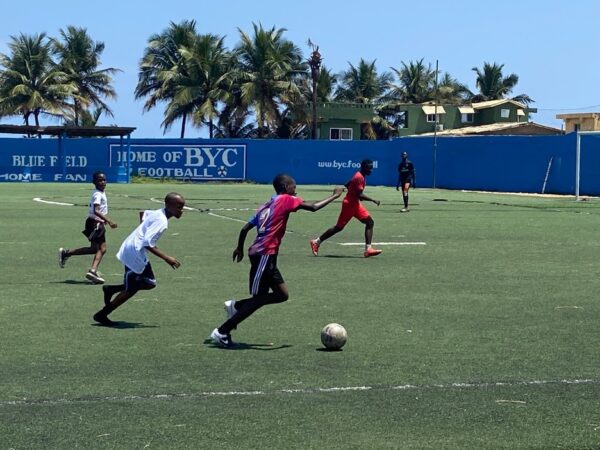
Our first festival day: children playing soccer after completing the academic exams and pro-social surveys.
While I loved the work we were doing, my favorite thing about Liberia was the people. Throughout our time working at CART, we had many conversations with Kou about political and social challenges in Liberian society and how they have a particularly damaging effect on young Liberian women. Her commitment and passion were clear in the stories she told of helping sexual assault victims both by providing medical care and by supporting them in their next steps — even publicly confronting corrupt politicians who were protecting perpetrators. We talked with many other colleagues who were excited to be working on projects that would further Liberian well-being, in a country that only recently escaped civil war and widespread violence. Many of our co-workers also wanted to become more prominent community leaders to enact further change. Not only did our co-workers share their professional aspirations and passions, but they also full-heartedly embraced us into their routines and traditions. They invited us to their independence day celebrations, they explored the beaches with us, and they shared many traditional Liberian meals with us. On our last day at the office, Kou even gifted Melissa and I brightly colored traditional clothing.
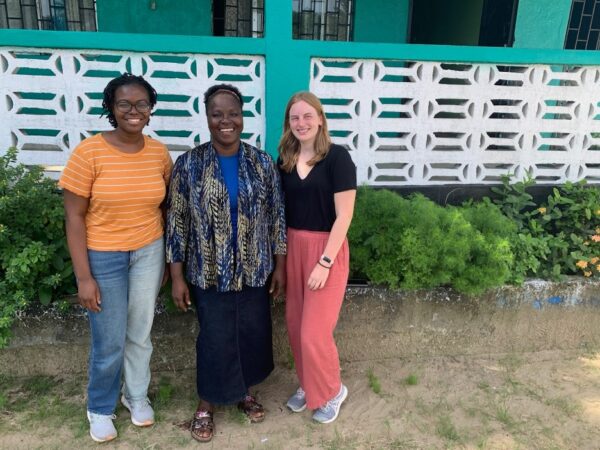
Melissa, Kou, and I outside the CART office.
Back on campus, Melissa and I are continuing to organize the data and plan for our replication of these festivals in Morocco. The work we did was fascinating, and I am extremely excited to complete the Morocco study and see our findings. I had expected our academic research to be valuable and inspiring; however, I was surprised by how much I was impacted by the people we met and the Liberian sense of community. Having spent meals, parties, and work days bonding with our colleagues, their love for their country was abundantly clear and present in all aspects of their lives. Every person we worked with was driven not by a desire for self-advancement, but rather by a fervent passion for giving back to their communities. As I move forward in my own career, the relationships I built in Liberia will serve as a reminder to center my work, and broader life, around such passion and love.

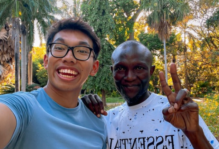
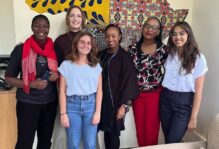
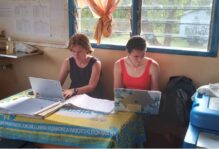
No comments.
Comments are currently closed. Comments are closed on all posts older than one year, and for those in our archive.